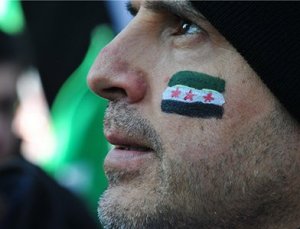
But despite the fact that Syria did manage to escape the military aggression of the United States and its allies, the civil war in this country rages on, as the radical Islamist groups that can be easily regarded as the terrorists continue fueling this war with arms and manpower. At the same time Washington and its friends haven’t given up on the idea of bringing the Assad regime down by all the means possible. In this game no trick is to be considered too dirty, should it be diplomatic pressure, discriminating economic sanctions, full-scale propaganda wars, chemical conspiracies, training or weapons provided to the opposition, you name it. The operating bases of the United States in the region are Saudi Arabia, Qatar and Turkey, the same very country that orchestrated the Syrian conflict in the first place. Today the Syrian opposition is divided, due to the fact that the radical groups are trying to expand their influence all across the country, fighting the regular troops along with attacking the so-called Free Syrian Army (FSA) and all sorts of anti-Assad groups and even the Kurds that have managed to maintain neutrality in this conflict so far. There’s a report saying that Islamists are starting to butcher the relatives of the local Kurd militia groups volunteers that were urged to fights those very radicals in order to protect the close ones.
The estimated number of different armed groups that wage war in Syrian today is going to hit 400. These are full of foreign mercenaries and fanatics that are usually called “jihadists” or “the warriors of Allah”. But why are they fighting each other then? The reasons behind their clashes are strictly ideological. Jihadists have stated from the very beginning that they are planning to establish an Islamic state at the Syrian soil that should be governed by the Sharia law. They have already put Sharia courts in place at the territories they have occupied in Syria. Now they are trying to force the locals to wear the cloths that are “only appropriate to wear in an Islamic state”. The next step is the introductions of separate classes schools for boys and girls and the imposition of new taxes.
In their turn the FSA forces proclaim “democracy” to be of their highest possible value, so they are planning to impose a moderate Islamic state in Syria should they win in this conflict. The United States, France, and the UK with a number of Persian Gulf countries have expressed their support for the Syrian opposition forces that grouped together in November 2012 in a National Coalition for Syrian Revolutionary and Opposition Forces (NCSROF), for they believe for whatever reason that this Coalition is the only “legitimate” representative of the Syrian people.
As the conflict rages on, the future of the Russia-US initiative to organize a peaceful conference under the UN umbrella that, should it become true, is scheduled on 23-24 November 2013. The conference goes under the name Geneva – 2 and it can really put an end to this bloody war, but the better part of the Syrian opposition hasn’t decided yet would it be sending its representatives to this conference or not. Different groups voice a concern they all seem to share – they won’t be able “to join the party” should the Syrian president Bashar al-Assad still be in command at the time the conference takes place. But despite all odds the UN representatives, the League of Arab and the “friends of Syria” are not ready to turn back on the prospects of the peaceful settlement.
As the leader of the National Coordination Committee for the Forces of Democratic Change, Hassan Abdul Azim states, at present there’s three opposition groups invited to Geneva – 2, the rest are still discussing their possibility to “join the party”. At the same time 19 Islamist groups have rejected the very idea of going to Geneva-2. A leader of one these groups commented the possibility of his people going to Geneva – 2 in a following way – “anyone going to this conference will be regarded as a traitor, so he must face punishment”. There’s no need to mention that a horde of mercenaries fighting in Syria haven’t been invited to the conference.
It’s clear why the Syrian authorities don’t think much of the prospect of Geneva – 2. Bashar al-Assad expressed criticism over the prospects of the peaceful settlement, but at the same time he said that there’s a chance that he would be running for president in 2014.
It’s seems that this gravely wounded, bleeding country that is heading for a humanitarian catastrophe, will remain a hostage of the Persian Gulf rulers and their own ambitions, Turkey and the Western countries with the United States at the head of it all. One could hardly believe the “sincere desire” of the West to stop violence in Syria, since no representative of the so-called “opposition” would dare to ignore the “Geneva-2” initiatives without an unofficial approval of the so-called “sponsors”.
Stanislav Ivanov, Ph.D., Senior Research Fellow at the Center for International Security of the Institute for World Economics and International Relations, an expert on the Middle East, exclusively for the online magazine “New Eastern Outlook”.
